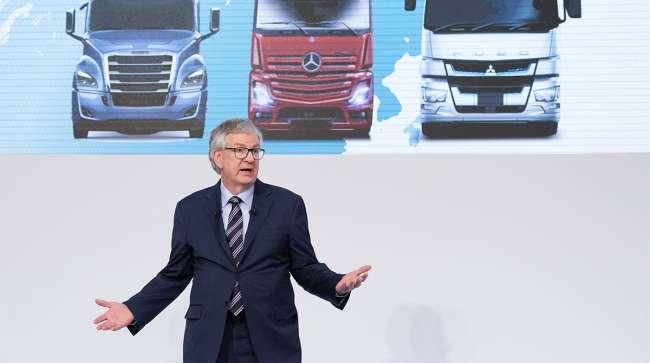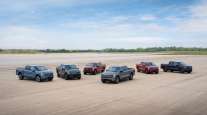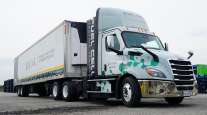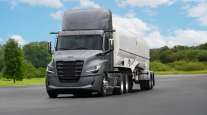Bloomberg News
Daimler CEO: Lack of Electric Truck Chargers a Top Concern

[Stay on top of transportation news: Get TTNews in your inbox.]
The world’s biggest commercial vehicle maker warned that slow progress adding charging infrastructure is threatening the shift to zero-emission trucking.
The lack of electric truck chargers in Europe and the U.S. “is my biggest concern,” Martin Daum, who heads Daimler Truck Holding AG, said in an interview. He cited lengthy permitting and the challenges of installing megawatt-level charging stations that could require the peak power demand of a small town. The German manufacturer reports first-quarter earnings May 2.
Daimler Truck, Volvo and Volkswagen’s Traton are under growing regulatory pressure to cut emissions, but sales of their electric trucks— including heavy-duty rigs like the Mercedes-Benz eActros 600 that can travel 311 miles on a charge — remain minimal. That’s partly due to the charger gap, and also because battery-powered trucks are more expensive than comparable diesel models.
Daum said electric truck technology is progressing nicely and that he’s optimistic on price parity if regulators charge for carbon dioxide-emissions. But he added that there needs to be greater support from governments to build out high-speed chargers, especially along highways.
“The clock is ticking, and time is running out quickly,” the CEO said.

Mercedes eActros. (Daimler Truck)
The Biden administration unveiled a road map in March aimed at bolstering truck charging infrastructure along key roadways in the U.S., where Daimler Truck owns the Freightliner and Western Star brands. The move is in response to growing concern from manufacturers that say more backing is needed for charging stations, grid improvements and other infrastructure.
Across the U.S., there are just 72 fast-charging ports capable of serving heavy-duty trucks, most of them in California, according to Energy Department data.
The European Union has adopted rules that require its main road network be equipped with chargers accommodating heavy-duty vehicles every 60 kilometers by 2030, a density that should allow battery-powered trucks to better compete with diesel equivalents.
Daimler Truck, Traton and Volvo are planning to spend $534 million to install at least 1,700 chargers in Europe, but Daum said the venture is making only slow progress due to lengthy approval processes and limited availability of green energy. The company joined a similar project with BlackRock Inc. in the U.S.
The three European manufacturers are nowhere close to meeting lofty goals for clean trucks to make up significant shares of their sales by the end of the decade. Daimler Truck, for instance, sold 3,443 zero-emission trucks and buses last year, which was just 0.6% of the total. The manufacturer has around 10 emission-free trucks and buses in its portfolio.
Want more news? Listen to today's daily briefing below or go here for more info:




